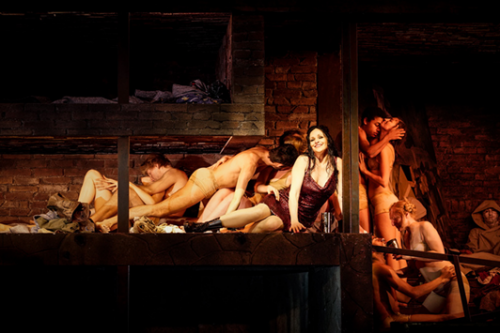 Germany Widmann, Babylon: Staatsopernchor and Staatskapelle Berlin / Christopher Ward (conductor), Staatsoper Unter den Linden, Berlin, 11.3.2019. (JMI)
Germany Widmann, Babylon: Staatsopernchor and Staatskapelle Berlin / Christopher Ward (conductor), Staatsoper Unter den Linden, Berlin, 11.3.2019. (JMI)

Production:
Director – Andreas Kriegenburg
Sets – Harald Thor
Costumes – Tanja Hoffmann
Lighting – Olaf Freese
Cast:
Inanna – Susanne Elmark
Soul – Mojca Erdmann
Tammu – Charles Workman
Priest-King – John Tomlinson
Death – Otto Katzameier
Euphrates – Marina Prudenskaya
Human Scorpion – Andrew Watts
Priest – Florian Hoffmann
Ezekiel – Felix von Manteuffel
Messenger – Arne Niermann
This trip to Berlin gave me a chance to attend the premiere of a new production of Babylon; I had not been able to see the original production when it was first staged in Munich. One of the main attractions here was the announcement of Daniel Barenboim as conductor but, unfortunately, he had to cancel due to recent eye surgery.
Jörg Widmann, a German clarinetist and composer, was commissioned to write this, his second opera, by the Bayerische Staatsoper. The opera premiered in Munich in 2012 under the baton of Kent Nagano, in a production by Carlus Padrissa and La Fura dels Baus. The opera was not very well received by the critics.
Babylon, a rather fantastic opera, deals with the confrontation of the Babylonians and their free-love way of life with the Jews, who have settled in Babylon and continue with their traditions. The protagonists are the Babylonian Inanna and the Israelite Tammu, who are in love. Torrential rains and the overflowing Euphrates cause the Priest-King to decide to offer a sacrifice to the gods, and Tammu is the chosen victim. In an echo of the Orpheus myth, Inanna goes down to the underworld in order to get her beloved back from Death, which she achieves, at least temporarily.
The libretto by Peter Sloterdijk is excessively long and without great interest, especially in the first part. Musically, it exhibits the characteristics of many contemporary operas which have in common a lack of melody and an abundance of percussion and shortage of strings in the orchestra. Ultimately, the work did not convince me, and I am in no rush to see it again.
The new Berlin production is by Andreas Kriegenburg; I have seen quite a few of his stagings in Munich, including a complete Ring Cycle. The production, which works well, consists of a set dominated by scaffolding with several empty spaces where the extras and chorus are usually placed. The most interesting scene is that of the confrontation between Inanna and Death. The costumes are strange but attractive, and the stage direction is effective, particularly with some of the secondary characters.
Daniel Barenboim was replaced as conductor by Christopher Ward. It is not easy to assess someone who is leading an unknown opera, and even more so if it is a contemporary work, but I found it a solid reading without any major problems. Both the orchestra and chorus gave good performances.
In the vocal cast, the best showing came from the two most important women in the opera: Inanna, the love of Tammu, and the singer who represents the Soul. Soprano Susanne Elmark was remarkable as Inanna, which is not an easy part to sing due to the complicated tessitura. The character of the Soul was interpreted by soprano Mojca Erdmann, who overcame the challenge of another difficult tessitura.
The part of the Israeli Tammu was sung by tenor Charles Workman, who had to fight with a complicated score, which proved problematic for him on more than one occasion.
Veteran bass John Tomlinson gave life to the Priest-King, and I found him in better vocal shape than I had heard in recent years. The character of Death was well played by Otto Katzameier, and mezzo-soprano Marina Prudenskaya did well as Euphrates.
José M. Irurzun
